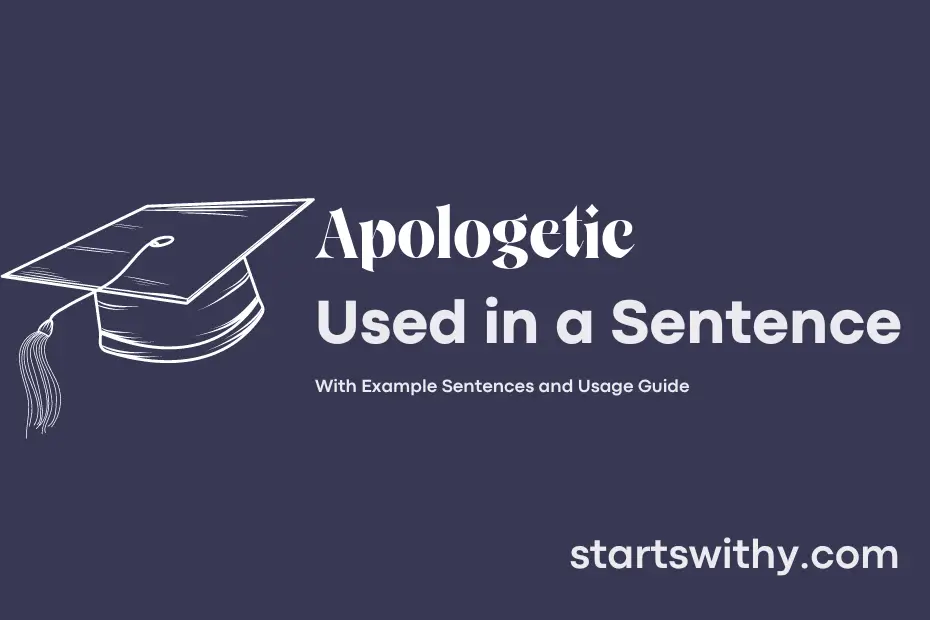Have you ever found yourself feeling apologetic for something you didn’t even do? Let’s explore the concept of being apologetic and how it influences our interactions with others.
Being apologetic means feeling or expressing regret, remorse, or sorrow for something that has happened or for something that you have done. It often involves acknowledging fault or showing sympathy towards others for any inconvenience or distress caused.
7 Examples Of Apologetic Used In a Sentence For Kids
- I am apologetic for pushing you by mistake.
- She looked apologetic after spilling her juice.
- He was apologetic for breaking his friend’s toy.
- The little boy was apologetic for being late to school.
- She felt apologetic for forgetting her homework at home.
- He was very apologetic for accidentally stepping on his friend’s foot.
- The teacher was apologetic for giving too much homework to the students.
14 Sentences with Apologetic Examples
- Apologetic about missing the deadline, the student asked for an extension on their assignment.
- Feeling apologetic for causing a disruption in the class, the student quietly left the room.
- In an apologetic tone, the student explained to the professor why they were absent from the previous lecture.
- When the student realized they had taken someone else’s seat, they quickly moved and offered an apologetic smile.
- During the group project presentation, the student became apologetic when they stumbled over their words.
- The student’s apologetic email to the professor explained that they had misunderstood the assignment.
- After accidentally spilling coffee on their classmate’s notes, the student gave a sincere apologetic gesture.
- The student’s apologetic expression showed their regret for forgetting to bring their textbook to class.
- With an apologetic look, the student returned a borrowed pen to their friend, realizing they had forgotten to give it back earlier.
- Realizing they had misunderstood the question on the exam, the student approached the professor apologetically seeking clarification.
- When the student accidentally deleted their group’s shared document, they sent an apologetic message to their teammates.
- The student’s apologetic tone during the debate showed their humility in accepting feedback from their peers.
- Due to unforeseen circumstances, the student arrived late to the class and entered apologetically to avoid disrupting the lecture.
- The student’s apologetic explanation for missing the extracurricular event expressed their disappointment in not being able to attend.
How To Use Apologetic in Sentences?
Apologetic is used in a sentence when one wants to express regret or acknowledge fault for something he or she has done.
Here is an example sentence using apologetic:
“I felt apologetic for arriving late to the meeting without letting anyone know in advance.”
To use apologetic in a sentence, simply think of a situation where you or someone else needs to apologize or show remorse. It can be for a small mistake or a major issue that requires an apology.
Remember that when using apologetic in a sentence, it is important to convey genuine regret for the actions or words that caused harm or inconvenience to others.
For beginners, it might be helpful to practice writing sentences with apologetic in different contexts to understand how it can be used effectively. You can also try to think about situations from daily life where an apology would be appropriate and then incorporate the word apologetic into a sentence to practice its usage.
By practicing using apologetic in sentences, you can improve your communication skills and learn how to express regret or remorse appropriately in various situations.
Conclusion
In an effort to express regret or remorse, sentences with apologetic tones serve to acknowledge mistakes or shortcomings. These sentences often aim to mend relationships, rectify misunderstandings, or take responsibility for errors. By using apologetic language, individuals can show sincerity, empathy, and willingness to make amends.
Whether in personal relationships, professional settings, or formal correspondences, incorporating apologetic sentences can foster communication and understanding. Through admitting fault, offering apologies, and seeking forgiveness, these sentences can pave the way for resolution and reconciliation. Ultimately, by using sentences with an apologetic tone, individuals can demonstrate humility, respect, and a commitment to repairing any harm caused.



